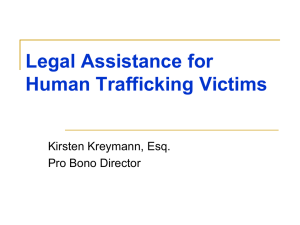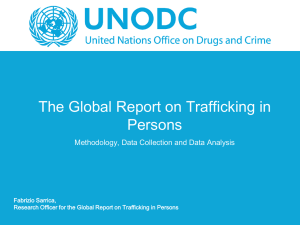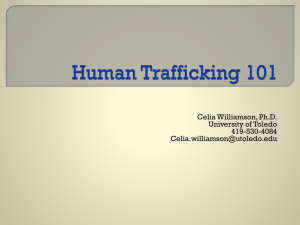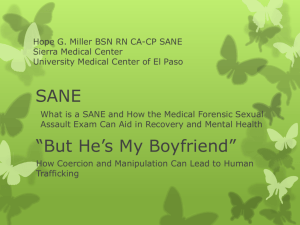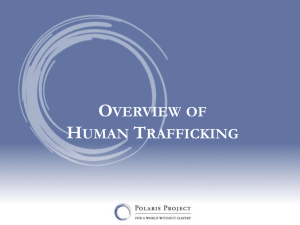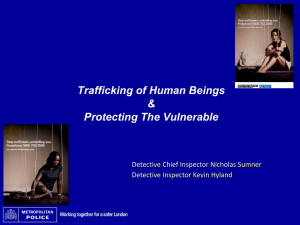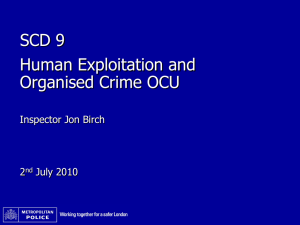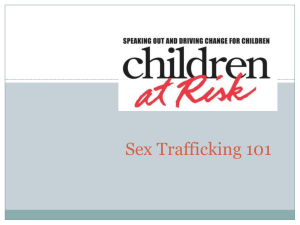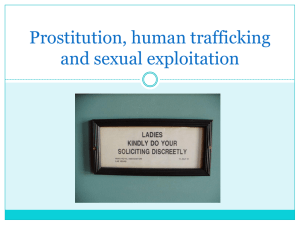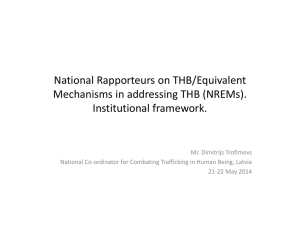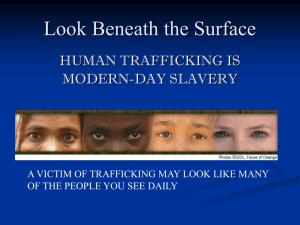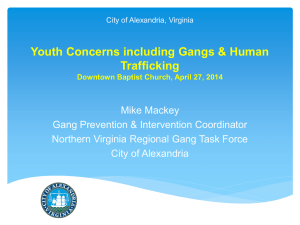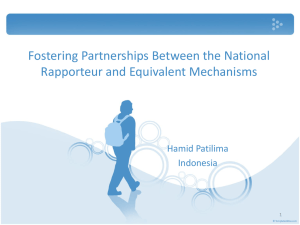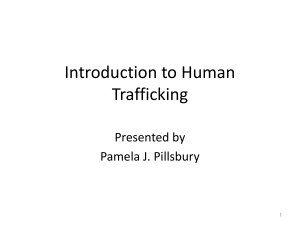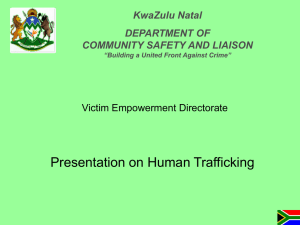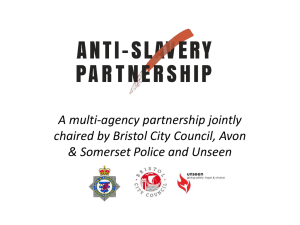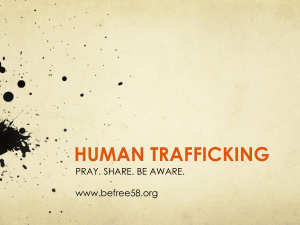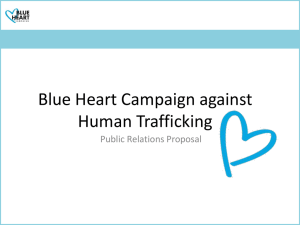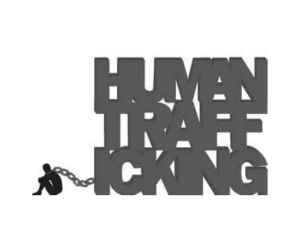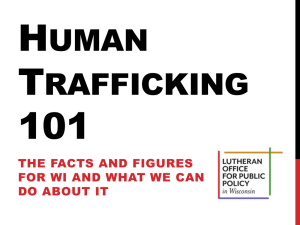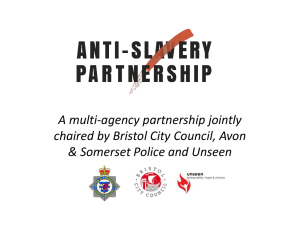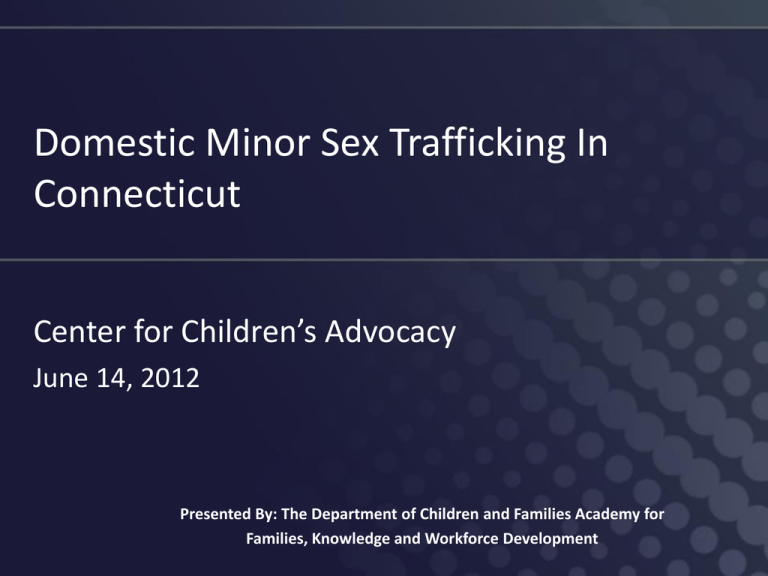
Domestic Minor Sex Trafficking In
Connecticut
Center for Children’s Advocacy
June 14, 2012
Presented By: The Department of Children and Families Academy for
Families, Knowledge and Workforce Development
http://www.nestfoundation.org/
HUMAN TRAFFICKING DEFINED
•
According to the TVPA (Trafficking Victims Protection Act 2008), Severe forms of
trafficking in persons are defined as:
– sex trafficking in which a commercial sex act is induced by force, fraud or
coercion, or in which the person induced to perform such an act has not
attained 18 years of age; or
– the recruitment, harboring, transportation, provision, or obtaining of a person
for labor or services, through the use of force, fraud or coercion for the
purpose of subjection to involuntary servitude, peonage, debt bondage, or
slavery.
HUMAN TRAFFICKING DEFINED CONT.
•
Any minor under the age of 18 who is involved in a commercial sex act is a victim of
human trafficking.
•
The sex trafficking of a minor, an individual who is not yet 18 years of age, does not
require proof of force, fraud, or coercion.
•
“Domestic Minor Sex Trafficking” refers to the commercial sexual exploitation of any
American citizen or lawful permanent resident under the age of 18.
•
“Commercial sex act” means any sex act for which anything of value is given to or
received by any person. This includes: prostitution, stripping/sexual performance, and
pornography.
2
TPVA VICTIM RIGHTS
• They are not culpable for crimes committed as a direct result of their
victimization.
• They are not to be detained in facilities inappropriate to their status as
crime victims.
• They should receive necessary medical care and other assistance.
• They should be provided with protection if their safety is at risk or if
there is a danger of additional harm or recapture of the victim by the
trafficker.
CT DCF HT Child Victim Data
•
Number of victims:
2008 victims 4
2009 victims 30
2010 victims 31
2011 victims 18
2012 victims 7
•
Trafficking type: DMST/CSE
•
Vulnerability: Majority of victims were on runaway/AWOL status; All
victims had experienced sexual abuse and/or neglect
•
Gender: 3 males to date
•
Age range: 13 – 18
•
Referrals: DCF Social Workers, Law enforcement, EMS, congregate care
facilities, CSSD, public defenders’ office, NGOs
CT LAWS TO PROTECT VICTIMS
• 2010 Public Act 10-115 − “An Act Providing a Safe Harbor for Exploited
Children” becomes law. The legislature amends Conn. General Statutes
Section 53a-82 to state that a person must be sixteen years of age or older to
be guilty of prostitution, and in any prosecution of a person sixteen or
seventeen years of age, there shall be a presumption that the actor was
coerced into committing such offense by another person.
• 2011 Public Act 11-180 - The law provides in part that upon the arrest of any
youth by an officer for a violation of section 53a-82, such officer shall report
suspected abuse or neglect to the Department of Children and Families in
accordance with the provisions of sections 17a-101to 17a-101d. Those
reports should be made to the DCF Hotline at (800) 842-2288.
DOMESTIC MINOR SEX TRAFFICKING
(DMST)includes…
•
Street prostitution (increasingly less common)
•
Stripping
•
Pornography
•
Escort services
•
Private Parties (increasingly more common)
•
Interfamilial pimping
•
Internet based prositution
•
Gang based prostitution
• Services exclusive to members
• Human Trafficking vs. drugs and weapon sales
IN CONNECTICUT…and beyond.
4
HT/DMST IN PERSPECTIVE
•
US – 100,000-300,000 children are at
risk for commercial sexual exploitation
each year.
•
Average age of entry into prostitution is
11-14
•
30% of shelter youth and 70% of street
youth are victims of commerical sexual
exploitation
•
DCF – 90+ confirmed cases
VICTIM PROFILE
•
Youth of any ethnicity, race, or religion
•
Youth of any socio-economic class
•
Youth both male and female
•
Youth of any sexual orientation
•
Youth of all ages, including teenagers
•
Vulnerable youth
•
Youth with histories of abuse
•
Homeless, Runaway Youth
•
Youth within the Foster Care System
•
Youth lacking a Safety Net
AT A HIGHER RISK FOR VICTIMIZATION
• Females
• Children involved with DCF
• Children from low income communities
• Black female children
CORRELATED RISK FACTORS of DCF YOUTH AND
TRAFFICKING
•
Unstable Home Life
•
Physical Abuse
•
Sexual Abuse
•
Chronic Runaway
•
Exposure to Drugs
•
Chronic Neglect
•
AWOL/Truancy
THE TRAFFICKER
•
Can be a pimp, a boyfriend, father, mother, brother, uncle, a coach, a teacher or anyone
exerting control over a minor, even a peer
•
Not always organized criminals
•
Both men and women of varying ages
•
Any ethnicity or race
•
Anyone who benefits from the commercial sexual exploitation of a minor or facilitates the
commercial sexual exploitation of a minor
6
THE TATICS
• Force =Violence
• Fraud = Seduction, Grooming
• Coercion = Threats of Violence
– Infiltrating a congregate care setting with a “bottom bitch”
– Scouting a schools, train and bus stations, malls, cinemas,
ANYWHERE THAT CHILDREN AND YOUTH SPEND TIME
– Looking for weaknesses/ vulnerabilities
IDENTIFYING CASES OF DMST
Due to the covert nature of the crime, sex trafficking can come to your attention
indirectly through other violations:
– Prostitution
– Domestic violence crimes
– Drug charges
– Runaways/homeless
– Cases of assault
– Curfew violation
– Loitering/trespassing
– Cases of sexual abuse/neglect
FACTORS IN IDENTIFICATION OF POTENTIAL
VICTIMS
• Lack of knowledge about whereabouts
• Hotel business cards, escort service business
cards, hotel keys, a number of condoms, excess
amount of cash
• Presence of overly controlling or abusive
boyfriend
• Chronic runaway/homeless youth
• Signs of branding (tattoo/jewelry)
FACTORS IN IDENTIFICATION OF POTENTIAL
VICTIMS CONT.
• Inconsistency in stories
• Inability or fear to make eye contact
• Injuries/signs of physical abuse/torture
• Restricted/scripted communication
• Attitude – defensive, rude, evasive, aggressive
• Demeanor – fear, anxiety, depression, submissive,
tense, nervous
• Little knives or some kind of weapon
Policy 31-10-6.1
INTAKE AND INVESTIGATIVE RESPONSE TO HUMAN TRAFFICKING OF CHILDREN
The Department of Children and Families is committed
to the identification of, rescue and protection of, and
providing services for children who have been
identified as victims of human trafficking.
DCF RESPONSE
If there is reasonable cause to
SUSPECT human trafficking of a
child call the DCF Careline at
800.842.2288.
Be very clear to inform the
screener that you suspect that
the child may be a victim of
human trafficking/DMST
Questions and Concerns
Contact Information
Tammy Sneed
Director of Girls Services
860-462-4314
Tammy.Sneed@ct.gov

